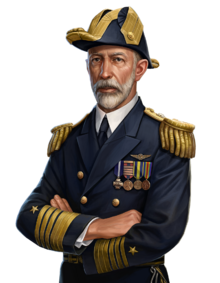Joseph Reeves
 Joseph Reeves
Joseph Reeves

Commander Base Trait
Football Helmet

Damage of bombs and torpedoes launched by aircraft at your ship (-16%)
Sea detectability range (-2%)
Air detectability range (-2%)
Commander Bio:
Joseph Reeves (1872-1948) was a U.S. Navy admiral (1933). While still attending the Naval Academy, he became famous as a member of the Navy football team, both as a player and the inventor of a football helmet. In the summer of 1898, Reeves participated with distinction in the Battle of Santiago de Cuba as a crew member serving on battleship Oregon. This was followed by years of service on various ships and a return to the academy as an instructor and, simultaneously, a football coach. Captain Reeves was briefly in command of USS St. Louis, and during World War I, while commanding battleship Maine, he participated in convoy operations in the Atlantic.
In the early 1920s, Joseph Reeves graduated from the Naval War College and became one of the first officers to truly appreciate the prospects of naval aviation. After qualifying as a naval aviation observer, he raised his flag on USS Langley, the first U.S. aircraft carrier. As commander of the U.S. Navy's first carrier force, Reeves laid the foundation for carrier-based aircraft tactics. The culmination of his career was serving as U.S. Navy Commander-In-Chief in 1934. During World War II, the veteran sallor returned to action and worked on committees responsible for supplying the U.S. Armed Forces until the end of hostilities.
Commander Skill 1
Not the One for Nuisance

Risk of catching fire (-2/-4/-6/-8%)
Risk of flooding and torpedo damage to the citadel (-2/-4/-6/-8%)
No-Fly Zone

Your ship's average AA Damage per second (+4/+8/+12/+15%)
Your ship's AA guns firing range (+2/+3/+4/+5%)
Agile Seagull
Battleship gun traverse speed (+0.3/+0.6/+0.9/+1.2°s)
Cruiser gun traverse speed (+0.3/+0.6/+0.9/+1.2°s)
Destroyer gun traverse speed (+0.3/+0.6/+0.9/+1.2°s)
Rudder-shift time (-2/-4/-6/-8%)
Commander Skill 2
Gyrating Drillbits

Battleship gun traverse speed (+0.3/+0.6/+0.9/+1.2°/s)
Battleship main gun AP shells damage (+2/+4/+6/+8%)
Maximum battleship speed (-7%)
One-Way Ticket

Torpedo damage (+1/+2/+3/+5%)
Bird's Eye View

Airstrike attack range (+1/+2/+3/+4%)
Main battery range(+1/+2/+3/+4%)
Commander Skill 3
Firefighter

Damage Control Party cooldown time (-4/-8/-12/-15%)
Risk of catching fire (-4/-8/-12/-15%)
Damage Control Party duration (-40%)
Reduces number of fires to 3
On Second Thought

Shell type switching time if all main battery guns are fully loaded (-15/-30/-45/-55%)
Main Battery reload time (-2/-3/-4/-5%)
Sea Wings

Airstrike aircraft cruise speed (+1/+2/+3/+4%)
Maximum movement speed (+1/+2/+3/+4%)
Commander Skill 4
Master Mechanic

Amount of HP recovered (+3/+6/+8/+10%)
Repair Party charges (+1/+1/+2/+2)

Speed of torpedoes launched by airstrike aircraft (+1/+2/+3/+4kt)
Arming time of torpedoes launched by airstrike aircraft(-2/-4/-6/-8%)
Damage of torpedoes launched by airstrike aircraft (+1/+2/+3/+4%)
Iron Feathers

Maximum HP (+1.5/+3/+4.5/+6)
Airstrike aircraft HP (+4/+8/+12/+16%)
Shows the direction of the closest enemy ship if your ship is armed with airstrike
Commander Legendary Skill
Will to Rebuild

Amount of HP recovered (+27.5/+47/+73/+110%)
Repair Party duration (-20/-30/-40/-50%)
Special Effect: Rate of repair per second +0.3% Auto-repair when HP is equal to or less than 20% Active when an allies shop is within X range (1.5/2/2.75/3.5km)
Fight Fire With Fire

Fire damage to your ship for each active fire (-6/-9/-12/-15%)
Removes damage-over-time effects from your ship whenever there are 3 concurrent fires. Can only be triggered if your Damage Control Party is on cooldown or fully depleted